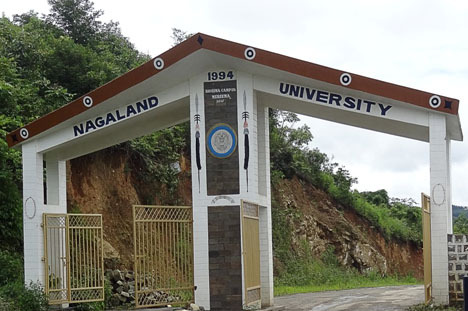Nagaland University PhD Admission Dates for 2025–26 Academic Session
Kenfra Research - Shallo2025-07-04T17:15:17+05:30Nagaland University has officially opened its doors for PhD admissions for the academic session 2025–26. Starting from June 20, 2025, eligible postgraduate candidates can apply to pursue research-based doctoral programs across a range of disciplines. Known for its peaceful academic setting, experienced faculty, and focus on regionally relevant research, Nagaland University continues to build its reputation as a destination for serious scholars from across the country.
This blog provides a detailed breakdown of the Nagaland University PhD Admission process, eligibility, courses offered, important dates, and tips for aspiring researchers interested in applying for the 2025–26 academic cycle.

About Nagaland University
Established in 1994, Nagaland University is a central university located in the northeastern state of Nagaland. The university has grown steadily over the years and now functions through four main campuses: Lumami (headquarters), Kohima, Medziphema, and Dimapur.
With departments across humanities, sciences, social sciences, education, agriculture, and commerce, the university provides a unique academic atmosphere that combines formal research with cultural diversity and environmental consciousness. It is also one of the few institutions offering advanced academic opportunities in the largely underserved northeast region of India.
PhD Admission Timeline for 2025–26
For the academic year 2025–26, the PhD application window is already open. Here is a brief overview of the important dates:
Start of Applications: June 20, 2025
- Last Date to Apply: July 12, 2025
- Entrance Test: To be announced (likely late July)
- Interviews/Viva Voce: Expected in early August 2025
Applicants are encouraged to complete their applications as early as possible to avoid last-minute errors or delays.
Eligibility Criteria
To apply for a PhD program at Nagaland University, candidates must meet the following academic and procedural requirements:
Academic Qualifications:
- A Master’s degree in a relevant subject with at least 55% marks (or equivalent grade under the UGC guidelines).
- A 5% relaxation (i.e., minimum 50%) is applicable to candidates from SC/ST/OBC (non-creamy layer) and differently-abled categories.
Exemption from Entrance Test:
- Candidates who have qualified for UGC-NET, CSIR-NET, GATE, JRF, or other national-level eligibility tests are exempted from the written entrance examination. However, they are still required to appear for the interview.
Eligibility for Part-Time PhD:
- Working professionals employed in recognized institutions, universities, research centers, or government departments are eligible to apply under the part-time PhD category, provided they meet the academic criteria and submit an employer’s No Objection Certificate (NOC).
Departments Offering PhD Programs
Nagaland University offers PhD programs across multiple faculties and departments. Students can apply to any of the following research disciplines depending on their academic background and research interests:
Science:
- Botany
- Zoology
- Chemistry
- Physics
- Mathematics
- Environmental Science
Humanities & Education:
- English
- History
- Education
- Linguistics
- Philosophy
Social Sciences:
- Sociology
- Political Science
- Economics
Commerce & Management:
- Commerce
- Business Administration
Agricultural Sciences:
- Agronomy
- Horticulture
- Soil Science
- Plant Breeding and Genetics
Each department under the Nagaland University PhD Admission process offers a limited number of seats, based on faculty availability and ongoing research projects. Applicants are encouraged to select research areas that closely align with the department’s expertise to improve their chances of selection and effective research supervision.
Application Procedure
The PhD application process is straightforward, but candidates should be careful to follow each step correctly. Here is an outline of how to apply:
Step 1: Fill the Application Form
Applicants must fill out the prescribed application form carefully, entering personal details, academic qualifications, intended research area, and preferred department.
Step 2: Prepare and Attach Required Documents
Applicants are required to submit the following documents along with the application form:
- Postgraduate degree and mark sheets
- Caste or disability certificate (if applicable)
- UGC-NET/GATE/JRF certificate (if exempt from entrance test)
- No Objection Certificate (for part-time candidates)
- Statement of Purpose (SOP) or brief research proposal
- Valid ID proof
Step 3: Pay the Application Fee
A non-refundable application fee must be paid. The amount usually differs for general and reserved categories. Payment instructions are clearly mentioned in the admission notification.
Step 4: Submit the Application
Applications can be submitted either online or in person, depending on the university’s procedure for the year. Applicants should keep a copy of their form and fee receipt for reference.
Selection Process
Admission to the PhD programs involves a two-step selection process:
1. Written Entrance Test:
- Candidates who are not exempted through national eligibility tests must appear for a university-level entrance exam.
- The test generally includes questions on:
- Research methodology
- Analytical reasoning
- Subject-specific knowledge
2. Interview/Viva Voce:
- Shortlisted candidates (both from the entrance test and NET/JRF qualified group) will be invited for an interview or viva voce.
- The interview panel evaluates the candidate’s:
- Research proposal or idea
- Subject knowledge
- Communication and analytical skills
- Feasibility of proposed research within university resources
Tips for Aspiring PhD Candidates
If you are planning to apply this year, here are a few practical tips to improve your chances:
1. Choose Your Research Area Thoughtfully
Ensure that your proposed research topic aligns with the expertise of faculty members in your chosen department.
2. Write a Clear SOP/Proposal
Whether applying for full-time or part-time, your Statement of Purpose or preliminary research proposal should be concise, original, and demonstrate depth of thought.
3. Prepare for the Interview
Brush up on your subject knowledge, research methodology, and current developments in your chosen field before attending the viva voce.
4. Seek Guidance
If possible, reach out to former students or faculty for insights into the university’s expectations.
Your Doctoral Journey Begins Here!
Nagaland University’s PhD admission process presents an excellent opportunity for postgraduate students and professionals aspiring to contribute meaningfully to academic research. With a wide range of disciplines, supportive faculty, and growing research infrastructure, the university continues to promote serious scholarship in a calm and inclusive academic environment.
Whether you’re passionate about scientific discovery, literary analysis, agricultural sustainability, or policy research, the PhD programs at Nagaland University offer the right platform to begin your journey. With the application deadline approaching on July 12, 2025, now is the perfect time to take that next big step in your academic career.










Leave a Reply